![]()
The curious task of economics is to demonstrate to men how little they really know about what they imagine they can design – Friedrich August von Hayek
Economics is the social science of studying production, distribution, and consumption of goods and services. It explores how economic actors behave and interact with one another.
Economists teach theories, methods, and principles, study and research the impact of economic policies, deal with all kinds of data and organize it to come to useful conclusions and decisions, create policies that impact everything from organizational success to global harmony, and much more.
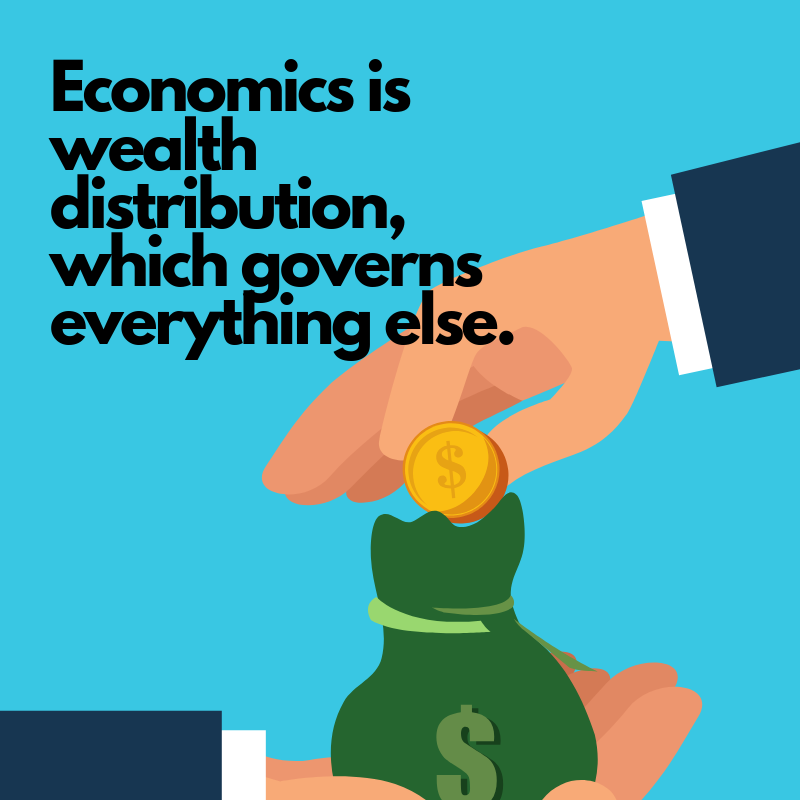
When you study economics, you get an immersive education in the rules that govern our world. There are many issues in our world that economists are in a rare position to influence. Their work can vastly improve society by helping to create theories and models that focus on producing better outcomes for more people. One of the most famous examples of this is John Forbes Nash Jr., whose Nash Equilibrium grappled with the need to make decisions not only based on what’s best for you, but what others are likely to choose based on what’s best for them. Curbing our Darwinian impulses is important throughout society, but especially in economics, which governs our individual and collective qualities of life.
One fascinating aspect of economics is how it’s viewed as a science even though it’s more a mixture of science and trial by error. With a bit of inspection it becomes clear that economics is an extremely subjective field that’s based on our individual and societal limitations. Nash had schizophrenia and believed that men wearing red ties were part of a communist conspiracy against him. Much of his most important was done in the 1950s, yet in 2004 noted economists Charles Holt and Alvin Roth wrote that “Students in economics classes today probably hear John Nash’s name as much as or more than that of any economist.”
Due to the intangible nature of economics, the field is ripe for change. Many of its most important thinkers and theorists are from long before Nash. Our society is lacking when it comes to breakthrough economics innovation that grapples with current events, which creates opportunities for you to not only break into the field, but make vital contributions to it.
Another surprising facet of economics in higher education is its separation from business schools. You might think that economics would be intrinsically tied to business education, and the two of course overlap, but most schools have a separate business and economics department. Why? Because in theory an economics education is supposed to prepare graduates to work for greater social cohesion and efficiency through producing more harmonious economies, while in practice business schools teach graduates how to make and accumulate profits for themselves and their organizations.
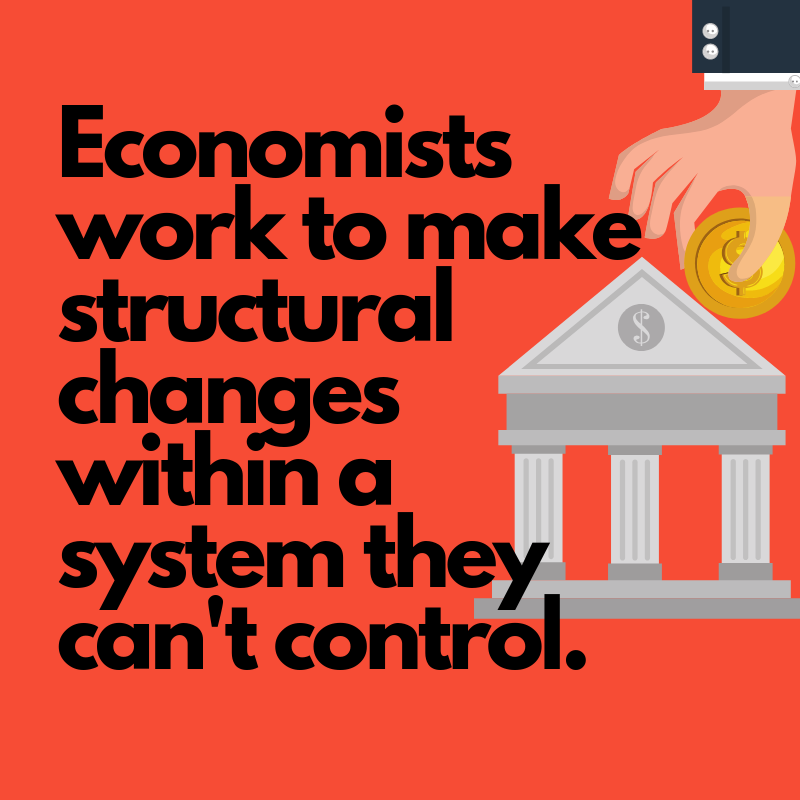
By earning an education in economics, you can help to do more responsive and useful work in the field that will impact its future.
In this guide we’ll look at the available economics degrees, including different specializations and degree levels, and share the work we at Degree Query have done to help you find the right economics degree for you. While you read it, please consider the following:
- What are your overarching career goals, and how can an economics degree help you achieve them?
- What degree level have you earned in higher education? What job do you want, and what degree level is required to qualify for it?
- You don’t have to know exactly what you would do within economics, but you should have a general idea about where you’d work (think tanks, government agencies, businesses, etc.).
- How much can you afford to pay in tuition for a specific economics degree you’re considering, and how much would you have to take out in loans to pay for one?
- There are a wide range of costs associated with different economics programs depending on the school you choose to earn one from, its delivery format, the scholarships, and loans you might qualify for, among other factors.
- It’s also always preferable to pick a school where you can pay for tuition rather than borrow. But if you need to borrow money to afford a program, always strive to take out public loans over private ones. You should also only pick schools that are accredited, affordable, and non-profit over expensive, for-profit schools.
- How much time do you have to take your economics degree each day, week, and in total before you graduate from it? Different programs offer their education curriculum through a variety of formats.
- What’s the best delivery format for you to attend your economics degree? Would you rather attend school full-time, part-time, online, on-campus, or in a hybrid of online and traditional on-campus learning?
- Where would you like to live and work after earning your economics degree? Different states and territories have different demands for economists.
- What is your career/educational experience, and how can specific economics programs enhance your strengths and mitigate your weaknesses?
- What are the available specializations in economics degrees? How can a specialization or focus of a program help you get the education you want and reach your career goals?
These are just some of the questions you should be asking yourself. When you’re searching for a degree program, it’s helpful to write out what you’re looking for, what qualifications you have, and what parameters you have to abide by. Use these questions as a guide and add any to them that you find pertinent.
Before we look into specific degree levels and specializations, let’s look at what you’ll get out of an economics degree:
Economics Degrees Build Skills and Aptitudes In
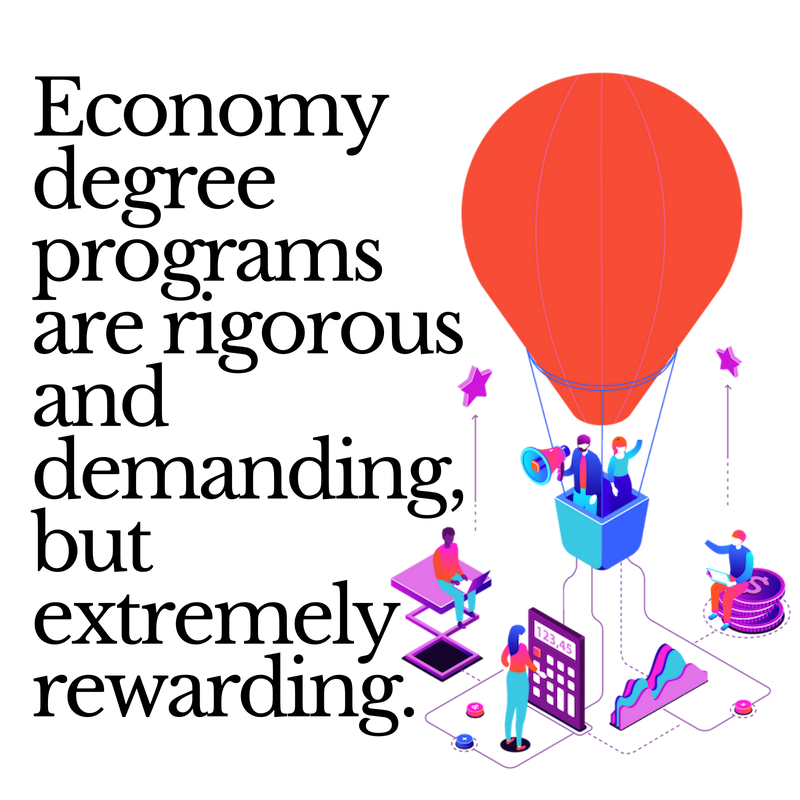
- Analytical Chops: the ability to examine data, find patterns within it and synthesize those findings into useful, logical conclusions is central to becoming a successful economics student and professional, and perhaps the main thing you’ll work towards in an economics degree program.
- Intellectual Curiosity: important economic discoveries and theories often come from reexamining consensus positions. In economic degree programs, you’ll absorb what’s come before you with an eye towards innovation.
- Math: you’ll use calculus, algebra, and statistics to solve real problems throughout your economics study and work, so having strong math skills or brushing up on them before entering an economics program would be extremely helpful.
- Intellectual Versatility: economics is heavily impacted by psychology, politics, history, and sociology. Having a breadth of knowledge about many different topics and areas of society is central to your work, and any good economics program.
- Patience While Facing Complexity: you’ll be examining incredibly layered problems and datasets, and will learn to keep your calm through frustration, as well as approach problems in multiple ways.
- Reading Comprehension and Communication: successful economists inhale information and can distill it into useful conclusions. You’ll need to read constantly, understand what you’re reading, and effectively communicate it with math, writing and speaking to peers, supervisors, and people unfamiliar with economics.
- Motivation: you’ll need to be dogmatic in your pursuit of an economics degree and career. Sacrifice and self-discipline will spur you onward. These degree programs are an opportunity to cultivate those aspects of yourself, but you’ll need to do much of the heavy lifting.
Of course, you won’t be completely alone. You’ll have peers, professors, and the opportunity to network with professionals in the field that can set an example for your career. We’re also here to make your life easier:

How Can We Help You Find the Right Economics Degree for You?
At Degree Query we’ve worked very hard to help you find the best degree for you, whether that’s in economics or elsewhere. We’ve ranked schools, jobs, and degree types. We’ve also answered common, pressing questions about the degree options available, written reports about the state of higher education, and offered you tools like our interactive compare careers matrix that was designed to help you select the best educational path for you. Some of the content we’ve produced that’s specifically focused on economics degrees and the schools that house them includes:
Rankings
- Top 50 Degrees For Changing The World
- Top 50 Degrees for the Future
- Top 10 Accounting Degree Programs
- 50 Best Online Master’s Degrees 2019
- Top 50 Highest Paying Master’s Degrees
- 15 Top Degrees for the Highest-Paying Business Careers
- Top 50 Online Business Degrees
- 50 Best Online Degrees for 2019
- Top 20 Highest Paying Online Degrees
Frequently Asked Questions
- What Can I Do With a Degree in Economics?
- What Can I Do With a Business Degree?
- What Degree Do People With a Job in Financial Planning Have?
- What Is the Benefit of an Accounting Degree Vs an Economics Degree?
- What Degree Do People With a Job in Purchasing Have?
- How Many Jobs Are Available in Finance?
- What Are the Highest-Paying Business Entry-Level Jobs?
Of course, this is just some of what we’ve done that covers business, finance, accounting, economics, and other related degree disciplines and career paths. To see all of our content related to economics, visit go here, or select another degree type that interests you. If you discover a school or program through our rankings that you think is a good fit, it’s helpful to e-mail their support staff directly to get more information about the programs you’re interested in and get assistance about its application requirements and processes.
Let’s examine the different levels of economics degrees and what they’ll prepare you to do:
What are the Different Levels of Economics Degrees?
There are four standard levels of economics degrees, including Associates, Bachelors, Masters and Doctoral degrees:

Associates in Economics
In these two-year programs you’ll get a foundational education in researching and analyzing economic issues and trends. You’ll look at markets, business decisions, and much more. In these programs, you’ll be prepared to continue your education in a four-year program. Associates in economics are offered online, and by community and junior colleges. They can cost significantly less than four-year programs while helping you earn credits towards them. Graduates are prepared for entry-level business positions and can work as junior economists, analysts, and consultants, but you’ll likely need to continue your education to have a long-lasting career in the field.
Bachelors in Economics
These are four-year programs that tackle the quantitative and qualitative aspects of economics. You’ll take courses like economic statistics, economic history, micro and macroeconomics, economic politics, econometrics, and much more. You might have the opportunity to specialize in areas like agricultural economics and financial economics, among other options. You’ll learn to use relevant software and research techniques to solve economic problems in many different sectors and settings. Graduates can work as statisticians, economists, and financial analysts, among many other roles, or continue onward in their economic education. The federal government offers some of the best entry-level jobs for economics Bachelor’s graduates.
Masters in Economics
In these one to two-year programs you’ll study advanced economic theory, applied economics, and econometrics, among many other subjects. Earning a graduate economic degree will give you a much better chance of having a longterm career in economics in comparison with a Bachelor’s or Associates. To enter these programs you’ll need to have a Bachelor’s degree, as well as a background in calculus-based economics, probability, statistics, and other foundational economic theories and skills. Some of these programs are more focused on the theoretical, while others are application-driven. These programs may require a thesis, and are likely to let students specialize in an area of economics they are keen on, like Developmental Economics, Sustainable Economics, Financial Economics, International Economics, among many others. For some, this can be a terminal degree, while others might continue to earn their doctorate.
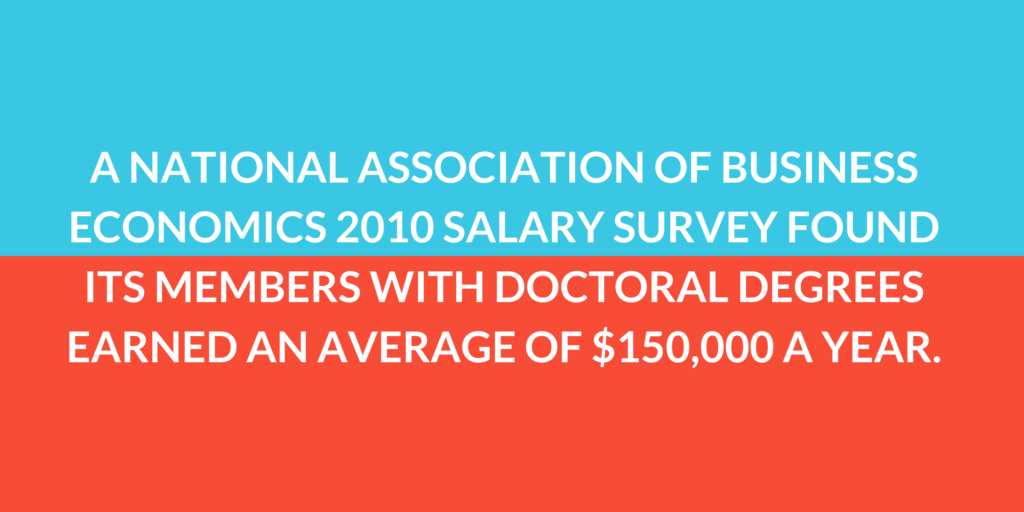
Doctorates in Economics
These programs take three to seven years to complete and are often paired with another discipline, like business administration, management, finance, international trade, labor economics, behavioral and experimental economics, among many other options. They are for qualified students with a Master’s in the field and significant work experience in the field. You can choose between programs that are more research focused and those that deal with applied economics. Often you’ll be required to do field work, turn in a dissertation, and defend it. Graduates will be prepared to work in all aspects of economics at the highest levels.
Apart from these degree levels there are also many different specializations in economics degrees that allow you to explore specific aspects of the field, or earn a dual degree in economics and business, among other options:
What are the Different Specializations Within Economics
MBA in Economics
While economics and business degrees are often separate, in this specialization track you’ll be able to combine them and prepare for roles in banking, government, finance, and much more. These programs will give you a general overview of what goes into business management decisions in many settings while also giving you a graduate level economics education. Other areas you’ll likely explore include leadership, marketing, production, and operations management.
Behavior and Strategy
Because so much of economics rests on the choices people make it can be very valuable to specialize in that part of the field. Areas covered include individual choices, group choices, and most importantly you’ll learn how strategic business decision-making changes markets, These programs can prepare you to work as a consultant, research analyst, among many other positions.
Data Analytics
This field is exploding because of the results it produces for organizations of all stripes and sectors. In economics programs specializing in data analytics, you’ll get extremely comfortable inspecting theories and models to discover patterns, forecast variables, and make decisions, among many other applications. You’ll likely explore the latest software and methods related to data analytics, and do advanced, difficult math.

Economic History
Previous economies and historical events aren’t all-determining when it comes to future economic trends and issues, but historical economies and past financial situations can teach us a lot about our society and where it’s going. In these degree specializations you’ll be prepared to work as a teacher, or perhaps continue on to graduate school (would make an excellent fit for someone interested in a specific aspect of practicing law). As with all historical study, it both needs to be respected and bucked.
Economic Policy
If you want to have a direct impact on future economies this is your opportunity. In this degree focus, you’ll delve into the design, installment, and effects of governmental economic policies. Graduates will be prepared to work as policy analysts for government agencies, research analysts for think tanks, and much more.
Learn more about what degree you need to be a policy analyst.
Economic Inequality and Poverty
This specialization has a strong need for new economists, and among the lowest supply of them. While free market capitalism is the system we live under, many people agree that a strong safety net is essential to societal cohesion. By working on these issues you can potentially make some improvements in these areas. By specializing here you can choose to fight against income inequality and poverty, proposing policies that help those who need the most assistance.
Labor Economics
Here you’ll work with micro and macro elements to understand labor markets and solve problems in them like unemployment, demand for undersupplied skills, and much more. You’ll also examine labor efficiency, hiring practices, legislation.
International Macro-Finance
For when you want to help control the world’s money. You’ll explore the global economy, how interconnected it truly is, precisely how events in one corner of the world can change profits globally, or in distant markets. If you want to work in banking or finance, this is a great option. You could also work at a non-profit or government agency as an analyst or policy advisor.
Economics Degrees in Conclusion
Before the guide ends, let’s take a quick look at how much you can expect to earn as an economist. According to the United States Bureau of Labor Statistics, the 2017 median pay for economists was $102,490 annually, or $49,27 an hour. There were 21,300 of these roles in 2016, which is expected to grow by 6% between 2016-26, leading to 1,300 new jobs. The typical entry-level education for these positions was a Master’s degree.
BLS also found the lowest 10% of economists made under $56,400, while the highest 10% made over $172,580. Top earners worked in finance and insurance, the federal government, and in scientific research and development services.
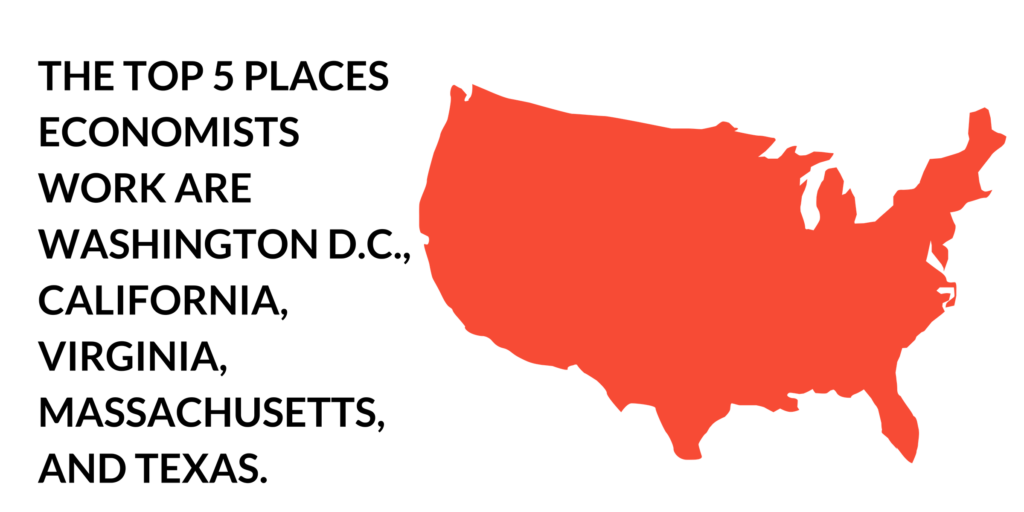
We hope you’ve found this guide extremely helpful. Economists play an integral role in our society and have an opportunity to do work that can drastically change it.
Remember to approach your search for a degree with a list of criteria important to you. We’re here to help you educate yourself about higher education, but you’ll need to do much of the legwork. Whenever you find a program or school that you think is a match for your needs and goals, you can always reach out to their support staff directly to request more information and get assistance in the application process.
Good luck in your education and career!
